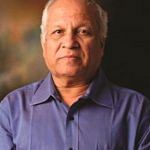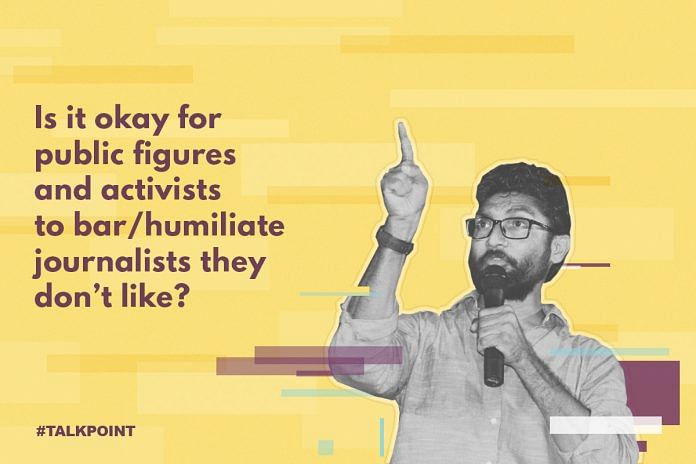Jignesh Mevani, while addressing a press briefing in Chennai, singled out a reporter from Republic TV, asking him to leave. He refused to address the press conference unless the reporter left. In solidarity with the reporter, other journalists walked out of the conference.
ThePrint asks: Is it okay for public figures and activists to bar/humiliate journalists they don’t like?
Instead of supporting Republic TV, journalists should boycott BJP till it’s supporters stop calling them ‘presstitutes’
 Shehla Rashid Shora
Shehla Rashid Shora
Former vice-president, JNUSU
The issue here is not one of like or dislike, but one of journalistic ethics. Journalism is about speaking truth to power, holding it accountable.
People who criticise the Republic & Times Now brand of “journalism” are not against media. In fact, they’re the ones who believe the press is a pillar of democracy. Those who consider Republic-brand reportage to be journalism do not, in fact, respect the idea of journalism.
We respect journalists. We let them into our homes. We take their calls even at midnight. If a channel argues that they will work only for TRPs, then they should expect to be treated as salesmen, and not expect the privileged access available to journalists.
Due to its biased and dangerous reportage of the JNU sedition row, Times Now jeopardised the life and safety of JNU students, teachers and supporters of the cause. Umar Khalid is a villain today because Arnab Goswami (then with Times Now) singled him out as a target for hate. Despite our best behaviour, news channels continue to peddle fake stories about Najeeb that even the Delhi Police has refuted.
During the reportage around journalist Gauri Lankesh’s murder, Republic TV tried to cover up the possible involvement of right-wing outfits. The day after her murder when I asked a Republic TV editor to remove their mic, some argued the reporter was simply doing his job. Such an argument can’t work in a situation where motivated reportage has the potential to incite violence or hostility.
Hannah Arendt reported that during the trials of Nazi officials after the fall of Hitler, when asked why they carried out the genocide, the officials replied that they were only doing their job and carrying out orders. Moreover, a journalist was convicted in the Nuremberg trials for incitement to genocide.
Republic TV crew chase people down the street, heckle people, abuse them on their TV show, and defame leaders like Jignesh, who do not have the means (or vindictiveness) to file defamation cases. If the media fraternity should organise against something, it is against the use of terms like “presstitute” by the right-wing on social media. They should boycott the BJP till its supporters stop using such nauseating terms.
Barring a troublemaker with a camera is not humiliation, it is a necessary precaution
 Kumar Ketkar
Kumar Ketkar
Senior journalist and economist
Nobody should humiliate anyone, and public figures have a social and moral responsibility to see that nobody is insulted, or abused. That sounds Gandhian.
But then Gandhiji did not humiliate anyone. It is not as if he did not have critics, detractors or strident haters. If he was living today, he would have been trolled and condemned widely. The community of trolls has many more Nathuram Godses today.
I think barring someone is not humiliating them. Today it is possible that an agent provocateur or a planted troublemaker can disrupt a meeting, interview or press conference. In these days of social media mayhem, it has become quite routine. With a camera and microphone in hand, such elements acquire more power. There is nothing wrong in screening, or even barring, those likely to create trouble.
This “unofficial” screening and sort of “pre-censoring” is not a desirable thing to do. But if the leader, activist or organisation has to deliver a policy statement, message or statement which is likely to generate a lot of heat and dust, a precautionary step is inevitable, even if undesirable.
The electronic media, particularly some TV channels, and some self-styled social media outlets, have begun to create a ruckus by raising extraneous issues, innuendo, even spreading calumny and slander, in a loud and almost obscene manner. This prevents a serious dialogue. It is quite legitimate for leaders, public figures or activists to feel threatened by such media groups because they shoot pictures selectively, tendentiously take quotes while going on air, and distort the event or news.
Therefore, I do not consider barring anyone is an obstruction of any democratic right.
Today Jigensh Mevani decides who is a good journalist, tomorrow it will be the RSS
 Hartosh Singh Bal
Hartosh Singh Bal
Political editor, The Caravan
First of all, the issue at hand is not whether or not the journalist is humiliated in such a situation. What is troubling is the fact that a public figure or an activist can choose to be selective about who can attend a publically called press conference. This decision cannot be made by any public figure or ideology.
Such partisanship will inevitably create a situation where Party A will consider one set of people journalists, Party B will consider a different set and so on. They will choose journalists on the basis of the coverage that they want.
I may strongly disagree with the brand of journalism that Republic TV practices but they cannot be barred from a public press conference. Public figures can choose who they interact with one on one. They can deny individual conversations, interviews to a channel they dislike, but asking them to leave a public press conference is unacceptable.
Moreover, pragmatically, it doesn’t make sense. If they believe that barring them will keep them from reporting on these issues, they are mistaken. Footage can be obtained and misused from many other platforms.
Today Mevani decides who is a journalist, tomorrow it will be RSS, day after the DMK. We cannot let that happen. Irrespective how we journalists feel about each other’s work, we can’t let people arbitrarily choose their journalistic preferences.
There has been a certain brashness in terms of media is now treated. Public figures adopt the ‘they don’t matter approach’ and the media is partly responsible for that. However, if we can keep our integrity above question, we can make sure people can’t just dismiss us because they personally dislike us.
Compiled by Deeksha Bhardwaj




Given that both the part time PhD student from JNU and the veteran journalist are followers of those political forces that supported or perpetrated Emergency, it is not at all surprising that they support censorship.
This man is neither a public figure nor an activist .He deserved to be just ignored.
Now it appears that most of the channels and the anchors are playing the game in a fixed manner and conveying “his masters voice” to show that they are the most patriotic lot on this earth and doing a great service to the nation. This type of journalism is very dangerous and threat to democracy in preserving the sanctity of the constitution and people’s fundamental rights. I believe such characters should be shown their place in the gambit of fair reporting and shaping the destiny of the country, instead being a lap dog of some divisive ideology. Otherwise, it will be waste of time in replying to some one’s questions who is not at all interested in answers.
If Journalist forum want to uphold their fair name and conduct, they should redraw their work ethics to save their very honourable profession from sinking rather than flexing their muscles under the garb of unity.
Shouldn’t Mewani want to engage with Republic frankly? He can literally out-talk them and make them look foolish. He seems to have sense, and can drill some into the anchors. Banning reporters is counter productive. Now that’s the only news coming out of Chennai, and he comes out looking like the Big Sulk. Go for Arnab, I say. Match wits, render him speechless, the world will applaud. This country is easily seduced by Elocution. Mewani is erudite too. He might catapult himself to PM prospect if he digs his heels and takes on and gives it back to Arnab. Go for it, young man. Don’t hold back. But do say Sorry to the Chennai reporter. It won’t hurt
The last time I heard the term “PM prospect” was in connection with Arvind Kejriwal.
Republic TV times now and zee TV and Amish sardana are not journalists. It is unfortunate that a section of the electronic media has hit abysmally low levels and has nothing to do with journalism. Leading the pack is republic TV and times now after arnab left has got two new anchors worse than arnab and naveeka has often proved she is substandard. No useful purpose would have been served entertaining these partisan shouting brigade of reporters from these channels.
But zee TV is not a news channel hahahahaha
JFA appreciates Chennai journalists for their show of solidarity
Guwahati: Journalists’ Forum Assam (JFA) appreciates the united strength shown by the Chennai based journalists against a politician’s unprincipled demand and urged the media fraternity of the country to stand behind them.
It may be noted that Jignesh Mevani, a newly elected legislator from Gujarat in a press meet on Tuesday in Chennai objected the presence of Republic Television reporter and then put condition that even if the reporter stay there, he must not ask questions. Angered with the condition, the television journalists decided to walk out of it as a show of solidarity.
The young legislator commented that he would not to speak to the Republic, the news channel led by Arnab Goswami as a policy. However, a Times Now reporter Shabbir Ahmed firmly encountered him saying that the legislator must not demand which channel should be there or which not in a press meet.
“We denounce the mentality of Jignesh Mevani to dictate the media. He must not make choices whether a particular reporter should stay or not in a press meet. For any reason, if he feels being abused by the coverage of a particular media outlet, he can go to the court,” said a statement issued by JFA president Rupam Barua and secretary Nava Thakuria.